Sorry that there will be a bit of a hiatus during my absence in 'foreign parts' for the next 10 weeks. I will try to post on occasion, but without regular access to a computer this might prove difficult.
Roger R.
"Susan, Eve's Daughter," said Father Christmas.

"Susan, Eve's Daughter," said Father Christmas. "These are for you," and he handed her a bow and a quiver full of arrows and a little ivory horn. "You must use the bow only in great need," he said, "for I do not mean you to fight in the battle. It does not easily miss. And when you put this horn to your lips; and blow it, then, wherever you are, I think help of some kind will come to you."
Last of all he said, "Lucy, Eve's Daughter," and Lucy came forward. He gave her a little bottle of what looked like glass (but people said afterwards that it was made of diamond) and a small dagger. "In this bottle," he said, "there is cordial made of the juice of one of the fireflowers that grow in the mountains of the sun. If you or any of your friends is hurt, a few drops of this restore them. And the dagger is to defend yourse at great need. For you also are not to be in battle."
"Why, sir?" said Lucy. "I think - I don't know but I think I could be brave enough."
"That is not the point," he said. "But battles are ugly when women fight."
C.S. Lewis, The Lion, the Witch and the Wardrobe, (1950)

All Hallows Eve
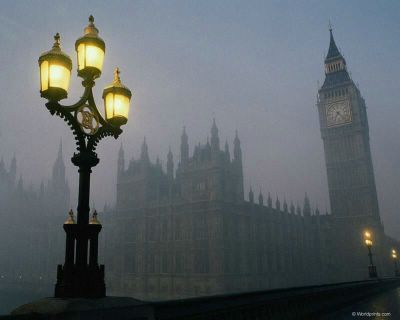
Lester looked round her. She saw the stars; she saw the lights; she saw dim shapes of houses and trees in a landscape which was less familiar through being so familiar. She could not even yet manage to enunciate to her companion the word death. The landscape of death lay round them; the future of death awaited them. Let them go to it; let them do something. She thought of her own flat and of Richard-no. She did not wish to take this other Evelyn there; besides, she herself would be, if anything at all, only a dim shadow to Richard, a hallucination or a troubling apparition. She could not bear that, if it could be avoided; she could not bear to be only a terrifying dream. No; they must go elsewhere. She wondered if Evelyn felt in the same way about her own home. She knew that Evelyn had continuously snubbed and suppressed her mother, with whom she lived; once or twice she had herself meant to say something, if only out of an indifferent superiority. But the indifference had beaten the superiority. It was now for Evelyn to choose. She said: "Shall we go to your place?"
Evelyn said shrilly: "No; no. I won't see Mother. I hate Mother."
Lester shrugged. One way and another, they did seem to be rather vagrants, unfortunate and helpless creatures, with no purpose and no use. She said: "Well . . . let's go." Evelyn looked up at her. Lester, with an effort at companionship, tried to smile at her. She did not very well succeed, but at least Evelyn, slowly and reluctantly, got to her feet. The lights in the houses had gone out, but a faint clarity was in the air -perhaps (though it had come quickly) the first suggestion of the day. Lester knew exactly what she had better do, and with an effort she did it. She took Evelyn's arm. The two dead girls went together slowly out of the Park.
Charles Williams : All Hallows Eve (Last paragraphs of Chapter 1 - The New Life)

I am sure...

... that some are born to write as trees are born to bear leaves: for these, writing is a necessary mode of their own development. If the impulse to write survives the hope of success, then one is among these. If not, then the impulse was at best only pardonable vanity, and it will certainly disappear when the hope is withdrawn.
C.S. Lewis to Arthur Greeves
The Letters of C.S. Lewis, (28 August 1930)

Beren & Lúthien in Angband
(Lines 3850 - 3865 of the The Geste of Beren and Lúthien)
Into the vast and echoing gloom,________________3850
more dread than many-tunnelled tomb
in Labyrinthine pyramid
where everlasting death is hid,
down awful corridors that wind
down to a menace dark enshrined;_______________3845
down to the mountain's roots profound,
devoured, tormented, bored and ground
by seething vermin spawned of stone;
down to the depths they went alone.
The arch behind of twilit shade________________3850
they saw recede and dwindling fade;
the thunderous forges' rumour grew,
a burning wind there roaring blew
foul vapours up from gaping holes.
Huge shapes there stood like carven trolls_____3855
enormous hewn of blasted rock
to forms that mortal likeness mock;
monstrous and menacing, entombed,
at every turn they silent loomed
in fitful glares that leaped and died._________3860
There hammers clanged, and tongues there cried
with sound like smitten stone; there wailed
faint from far under, called and failed
amid the iron clink of chain
voices of captives put to pain.________________3865
(JRRT)
Into the vast and echoing gloom,________________3850
more dread than many-tunnelled tomb
in Labyrinthine pyramid
where everlasting death is hid,
down awful corridors that wind
down to a menace dark enshrined;_______________3845
down to the mountain's roots profound,
devoured, tormented, bored and ground
by seething vermin spawned of stone;
down to the depths they went alone.
The arch behind of twilit shade________________3850
they saw recede and dwindling fade;
the thunderous forges' rumour grew,
a burning wind there roaring blew
foul vapours up from gaping holes.
Huge shapes there stood like carven trolls_____3855
enormous hewn of blasted rock
to forms that mortal likeness mock;
monstrous and menacing, entombed,
at every turn they silent loomed
in fitful glares that leaped and died._________3860
There hammers clanged, and tongues there cried
with sound like smitten stone; there wailed
faint from far under, called and failed
amid the iron clink of chain
voices of captives put to pain.________________3865
(JRRT)
YOU MUST LOOK AT IT TODAY... [Click Here]
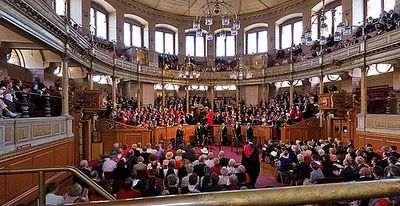
An ever-expanding Virtual Tour of Oxford University and City.
Now with over 2,500 panoramas from all around Oxford, including most of the colleges, including "JRR Tolkien's Oxford" - exploring some of JRRT's favourite places.
You have total control over each image... the floor of the "University Schools Building" is worth the visit on its own. Amazing.... GO NOW!

Jack and Joy... and marriage
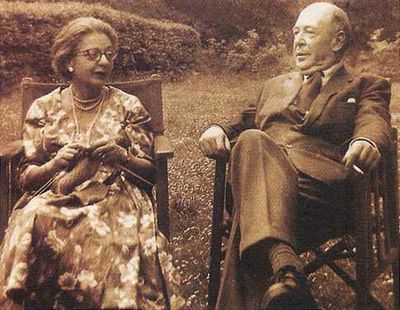
For we did learn and achieve something. There is, hidden or flaunted, a sword between the sexes till an entire marriage reconciles them. It is arrogance in us to call frankness, fairness, and chivalry 'masculine' when we see them in a woman; it is arrogance in them, to describe a man's sensitiveness or tact or tendernesss 'feminine.' But also what poor, warped fragments of humanity most mere men and mere women must be to make the implications of that arrogance plausible. Marriage heals this. Jointly the two become fully human. 'In the image of God created He them.' Thus, by a paradox, this carnival of sexuality leads us out beyond our sexes.
A Grief Observed

The famous Jack Lewis quote on Marriage...
C.S. Lewis on Marriage Protection
“... I should like to distinguish two things which are very often confused. The Christian conception of marriage is one: the other is the quite different question -- how far Christians, if they are voters or Members of Parliament, ought to try to force their views of marriage on the rest of the community by embodying them in the divorce laws. A great many people seem to think that if you are a Christian yourself you should try to make divorce difficult for every one.
I do not think that. At least I know I should be very angry if the Mahommedans (sic) tried to prevent the rest of us from drinking wine. My own view is that the Churches should frankly recognise that the majority of the British people are not Christians and, therefore, cannot be expected to live Christian lives. There ought to be two distinct kinds of marriage: one governed by the State with rules enforced on all citizens, the other governed by the Church with rules enforced by her on her own members. The distinction ought to be quite sharp, so that a man knows which couples are married in a Christian sense and which are not.
From Mere Christianity, Chapter 16:
Is he right? (RR)
“... I should like to distinguish two things which are very often confused. The Christian conception of marriage is one: the other is the quite different question -- how far Christians, if they are voters or Members of Parliament, ought to try to force their views of marriage on the rest of the community by embodying them in the divorce laws. A great many people seem to think that if you are a Christian yourself you should try to make divorce difficult for every one.
I do not think that. At least I know I should be very angry if the Mahommedans (sic) tried to prevent the rest of us from drinking wine. My own view is that the Churches should frankly recognise that the majority of the British people are not Christians and, therefore, cannot be expected to live Christian lives. There ought to be two distinct kinds of marriage: one governed by the State with rules enforced on all citizens, the other governed by the Church with rules enforced by her on her own members. The distinction ought to be quite sharp, so that a man knows which couples are married in a Christian sense and which are not.
From Mere Christianity, Chapter 16:
Is he right? (RR)
Tolkien on Marriage
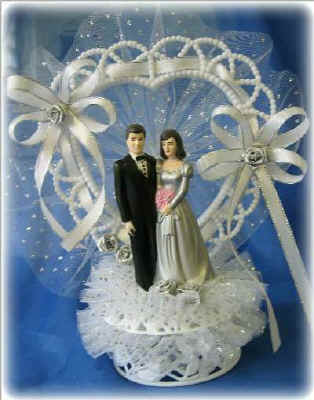
Nearly all marriages, even happy ones, are mistakes: in the sense that almost certainly (in a more perfect world, or even with a little more care in this very imperfect one) both partners might be found more suitable mates. But the real soul-mate is the one you are actually married to.
J.R.R. Tolkien, Letter to Michael Tolkien, March 1941

Eden's Courtesy

Such natural love twixt beast and man we find
That children all desire an animal book,
And all brutes, not perverted from their kind,
Woo us with whinny, tongue, tail, song, or look;
So much of Eden's courtesy yet remains.
But when a creature's dread, or mine, has built
A wall between, I think I feel the pains
That Adam earned and do confess my guilt.
For till I tame sly fox and timorous hare
And lording lion in my self, no peace
Can be without; but after, I shall dare
Uncage the shadowy zoo and war will cease;
Because the brutes within, I do not doubt,
Are archetypal of the brutes without.
C. S. Lewis, Poems, "Eden's Courtesy" (1964)

Despair?

"I will not seek it," the other replied.
"It has been opened once and it is enough. And you,are you sure that man can conquer until he has been wholly defeated? Are you sure that he can find plenitude till he has known utter despair? You will not let him despair of himself, but it may be that only in such a complete despair he finds that which cannot despair and is something other than man."
Shadows of Ecstasy - Charles Williams / ch.11

The Other Mrs. Moore
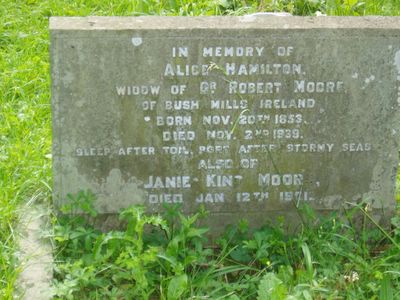
"There was in the grounds of The Kilns when I arrived there, away over beyond the desolate tennis court, a small two roomed weather-board shack. It was almost completely overgrown with creepers and bushes and was evidently not in use for any purpose. When I asked Fred Paxford about it he told me that it had been "Mrs Moore's house", and it had been built for her use. On further inquiry I came to understand that the "Mrs Moore" in question had been a family friend and had fallen on hard times and thus had been brought into the household in Ireland to "help", and that when things became very hard in her later life, Jack and Warnie had "rescued" her, brought her over from Ireland, and built that little bungalow for her so that she could spend her declining last years in peace and without worry.
This information may or may not be completely accurate as it was gleaned over a period of time; neither Jack nor Warnie would ever openly talk about their charitable works. The little house later became my "Gang Hut" (rather a posh one actually as it had two rooms and a coal fired heating stove) and also an alternative "sleep-out" bedroom for me to use when I was feeling adventurous or whatever.
I visited Mrs Moore's grave only a few weeks ago as it happens in order to point it out to some visitors. She shares the burial place of her Earthly residue with that of the other Mrs Moore, at Holy Trinity Church, Headington Quarry.
Douglas Gresham - Lenten Lands (1988)

Time Magazine

Above is the cover of the issue of Time Magazine which featured Lewis in the context of his novel work on spirituality, The Screwtape Letters.
In his original preface to the book, he astutely noted, "there are two equal and opposite errors into which our race can fall about the devils. One is to disbelieve in their existence. The other is to believe, and to feel an excessive and unhealthy interest in them. They themselves are equally pleased by both errors..."

To Laurence Harwood
Nothing much has happened to me except that I saw a rabbit yawn. I suppose people who keep tame ones have seen it often but this was a wild rabbit and I thought it a v. curious sight. It was a very bored triangular yawn in the middle of a long hot afternoon...
C.S. Lewis
December 23rd, 1947
C.S. Lewis
December 23rd, 1947
Looking 'Along' and Looking 'At'
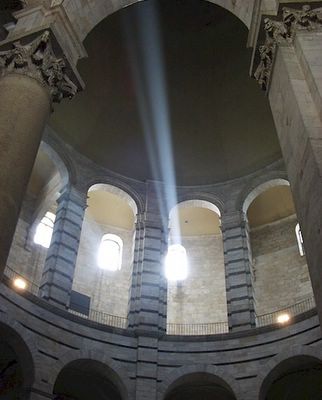
I was standing today in the dark toolshed. The sun was shining outside and through the crack at the top of the door there came a sunbeam. From where I stood that beam of light, with the specks of dust floating in it, was the most striking thing in the place. Everything else was almost pitch black. I was seeing the beam, not seeing things by it.
Then I moved, so that the beam fell on my eyes. Instantly the whole previous picture vanished. I saw no toolshed, and (above all) no beam. Instead I saw, framed in the irregular cranny at the top of the door, green leaves moving on the branches of a tree outside and beyond that, ninety-odd million miles away, the sun. Looking along the beam, and looking at the beam are very different experiences.
But this is only a very simple example of the difference between looking at and looking along. A young man meets a girl. The whole world looks different when he sees her. Her voice reminds him of something he has been trying to remember all his life, and ten minutes' casual chat with her is more precious than all the favours that all other women in the world could grant. He is, as they say, 'in love'. Now comes a scientist and describes this young man's experience from the outside. For him it is all an affair of the young man's genes and a recognized biological stimulus. That is the difference between looking along the sexual impulse and looking at it.
C.S. Lewis, "Meditation in a Toolshed"
1st published in The Coventry Evening Telgraph (17 July 1945)

James Bond - An Inklings connection!
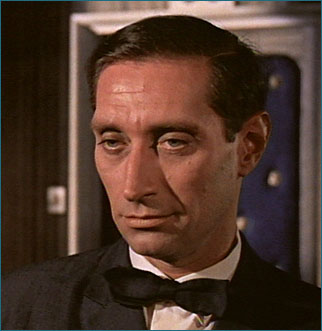
The year was 1959, Polish actor Vladek Sheybal arrived in England not knowing anyone and unable to speak English. He supported himself by working in menial jobs in a Polish delicatessen and then in an artifical jewellery shop in Brick Lane, London. When he finished his job at the jewellery shop, he took a train from Paddington station to Oxford with all his worldy goods in a small suitcase, and the only money he had in the world -- ten English pounds.
Soon after Vladek arrived in Oxford, the typical English weather turned sour and it began to rain. Taking refuge in a coffee shop, he was recognised and later befriended, by students who had seen the Polish film "Kanal" (1956) in which Vladek was featured, the night before at their local cinema -- a film as poignant and thought provoking now as it was then. Eventually, Vladek became a recognised student of English Literature at Merton College, Oxford after being taken under the wing of Professor Neville Coghill.
In 1963, Vladek was offered a small part in the second James Bond film "From Russia with Love" but was reluctant to take the part and turned it down. Eventually he was persuaded by Sean Connery (who was by now a close friend) to take the role of the villanous chess master 'Kronsteen'. Vladek played the part as usual, to perfection; creating a character so elegantly arrogant that 'Kronsteen' is perhaps the most believable and memorable Bond villains of the entire genre.
Wonder if Vladek met the rest of the Inklings whilst at Merton? After all J.R.R. Tolkien, Neville Coghill and Hugo Dyson were all fellows at Merton in the 1950s.

Under the Mercy
The grave of Charles Williams in an Oxford churchyard is marked by a stone bearing his name and the terse description: Poet, followed by the words, Under the Mercy.
Under the Mercy is a phrase that appears frequently in his writings, as it did in his conversation. He liked to refer to the Divinity by Its Attributes: the Mercy, the Protection, the Omnipotence. In his personal life he seemed always to be clinging to the faith that, balanced as he was upon the knife-edge of his Christian allegiance in the world of myth and magic that his passion-inflamed imagination had conjured up, he would find at last, in death if by no other route, the stillness of the Love of God. It was his wife, Michal, in one of those sudden flashes of crystal-clear insight of which she was not infrequently capable, who chose the inscription on the stone. Nothing could have been more appropriate.
Lois Lang-Sims: "Letters to Lalange – The Letters of Charles Williams to Lois Lang-Sims", page 16
Under the Mercy is a phrase that appears frequently in his writings, as it did in his conversation. He liked to refer to the Divinity by Its Attributes: the Mercy, the Protection, the Omnipotence. In his personal life he seemed always to be clinging to the faith that, balanced as he was upon the knife-edge of his Christian allegiance in the world of myth and magic that his passion-inflamed imagination had conjured up, he would find at last, in death if by no other route, the stillness of the Love of God. It was his wife, Michal, in one of those sudden flashes of crystal-clear insight of which she was not infrequently capable, who chose the inscription on the stone. Nothing could have been more appropriate.
Lois Lang-Sims: "Letters to Lalange – The Letters of Charles Williams to Lois Lang-Sims", page 16
Williams on Adam and Eve
Sweeter also than honey...

"More to be desired are they than gold, yea than much fine gold: sweeter also than honey and the honeycomb" (Psalm 19).
One can well understand this being said of God's mercies, God's visitations, His attributes. But what the poet is actually talking about is God's law, His commands; His "ruling" as Dr. Moffatt well translates in verse 9 (for "judgements" here plainly means decisions about conduct). What is being compared to gold and honey is those "statutes" (in the Latin version "decrees") which, we are told, "rejoice the heart". For the whole poem is about the Law, not about "Judgement" in the sense to which Chapter I was devoted.
This was to me at first very mysterious. "Thou shalt not steal, thou shalt not commit adultery" - I can understand that a man can, and must, respect these "statutes", and try to obey them, and assent to them in his heart. But it is very hard to find how they could be, so to speak, delicious, how they exhilarate. If this is difficult at any time, it is doubly so when obedience to either is opposed to some strong, and perhaps in itself innocent, desire. A man held back by his unfortunate previous marriage to some lunatic or criminal who never dies from some woman whom he faithfully loves, or a hungry man left alone, without money, in a shop filled with he smell and sight of new bread, roasting coffee, or fresh strawberries - can these find the prohibition of adultery or of theft at all like honey? They may obey, they may still respect the "statute", but surely it could be more aptly compared to the dentists's forceps or the front line than to anything enjoyable and sweet.
C.S. Lewis, Reflections on the Psalms, Chapter VI "Sweeter Than Honey" (1955)

The Inquisition

One might think that the phrase of Lord Acton (that "it cannot really be held that in Rome sixteen centuries after Christ men did not know that murder was wrong") might be held to apply [to the Inquisition]; it cannot be that men did not think such methods doubtfully holy. It was not so. Deep, deeper than we believe, lie the roots of sin; it is in the good that they exist; it is in the good that they thrive and send up sap and produce the black fruits of hell. The peacock fans of holy and austere popes drove the ashes of burning men over Christendom.
Charles Williams - The Descent of the Dove

Friday 26th January, 1923
"We went at our talk like a dogfight... He (Smith) and De la Mare are fast friends and imaginative philologists of a type which they have christened 'milvers' -- partly because it is a good word, partly because it 'supplies a long felt want' in rhyming with silver. Barfield hopes soon to meet De la Mare"
"All my Road Before Me"
The Diary of CS Lewis 1922-1927
"All my Road Before Me"
The Diary of CS Lewis 1922-1927
Tolkien to his son Christopher (extract)
10 April 1944
I sometimes feel appalled at the thought of the sum total of human misery all over the world at the present moment: the millions parted, fretting, wasting in unprofitable days - quite apart from torture, pain, death, bereavement, injustice. If anguish were visible, almost the whole of this benighted planet would be enveloped in a dense dark vapor, shrouded from the amazed vision of the heavens! And the products of it all will be mainly evil - historically considered. But the historic version is, of course, not the only one. All things and all deeds have a value in themselves, apart from their "causes" and "effects." No man can estimate what is really happening sub specie aeternitatis. All we do know, and that to a large extent by direct experience, is that evil labors with vast power and perpetual success - in vain: preparing always the soil for unexpected good to sprout in.
- from "The Letters of J.R.R. Tolkien"
I sometimes feel appalled at the thought of the sum total of human misery all over the world at the present moment: the millions parted, fretting, wasting in unprofitable days - quite apart from torture, pain, death, bereavement, injustice. If anguish were visible, almost the whole of this benighted planet would be enveloped in a dense dark vapor, shrouded from the amazed vision of the heavens! And the products of it all will be mainly evil - historically considered. But the historic version is, of course, not the only one. All things and all deeds have a value in themselves, apart from their "causes" and "effects." No man can estimate what is really happening sub specie aeternitatis. All we do know, and that to a large extent by direct experience, is that evil labors with vast power and perpetual success - in vain: preparing always the soil for unexpected good to sprout in.
- from "The Letters of J.R.R. Tolkien"
Cobwebby hours...
What happened to the power of the Rings once the One Ruling Ring was destroyed?

The most widely held position is that with the destruction of the One Ring all the remaining rings also lost their power (including the Three Elven Rings) and became ineffectual against the passage of time for which they were created. The reasoning behind this is because the One Ring was embodied with the power necessary to bind and control all the Rings of Power when the One's power was destroyed so was the power of all the other Rings. Those who held the Three; Gandalf, Elrond, and Galadriel departed over the sea into the West and took the Rings with them.
The evidence for this is found in several places:
"Yet many voices were heard among the Elves foreboding that, if Sauron should come again, then either he would find the Ruling Ring that was lost, or at the best his enemies would discover it and destroy it; but in either chance the powers of the Three must then fail and all things maintained by them must fade, and so the Elves should pass into the twilight and the Dominion of Men begin."
[The Silmarillion]
"But when all these things were done, and the Heir of Isildur had taken up the lordship of Men, and the dominion of the West had passed to him, then it was made plain that the power of the Three Rings also was ended, and to the Firstborn the world grew old and grey."
[The Silmarillion]
"But what would happen, if the Ruling Ring were destroyed, as you counsel? asked Gloin. We know not for certain, answered Elrond sadly. Some hope that the Three Rings, which Sauron has never touched, would then become free, and their rulers might heal the hurts of the world that he has wrought. But maybe when the One has gone, the Three will fail, and many fair things will fade and be forgotten. That is my belief."
[The Fellowship of the Ring]
The most melancholy reference is when the lady Galadriel explains to Frodo the fate of the Elves upon the outcome of the quest:
"Do you not see now wherefore your coming is to us as the footstep of Doom? For if you fail, then we are laid bare to the Enemy. Yet if you succeed, then our power is diminished, and Lothlorien will fade, and the tides of Time will sweep it away."
[The Fellowship of the Ring]
Because the primary power of the Three Rings is to slow or arrest the passage of time, Galadriel's words clearly mean that with the destruction of the One Ring, they too lose their power.
(end)

What About the Powers of the Seven and Nine?
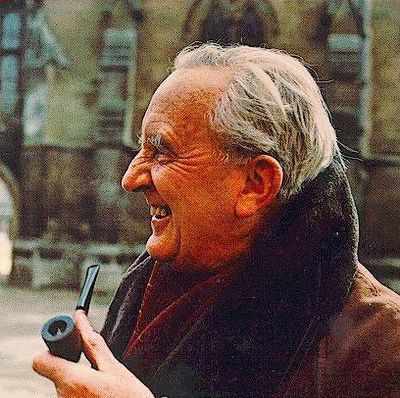
As stated, the Seven and Nine Rings were originally made by the Elves and not evil until Sauron forged the One and later took these rings by war. Their initial purpose was to slow the passage of time and preserve beauty, but since Sauron had a part in their making they became accursed and had evil powers. He gave the rings to different races of Middle-earth to enslave and so control them.
Sauron gave the Seven to the Dwarves, who proved harder to enslave:
"They ill endure the domination of others, and the thoughts of their hearts are hard to fathom, nor can they be turned to shadows. They used their rings only for the getting of wealth; but wrath and an over mastering greed of gold were kindled in their hearts..."
[The Silmarillion]
This implies their rings had other powers but were not used probably because this would draw attention to the user and all that he did.
Sauron gave the Nine to Mortal Men who proved easiest to ensnare. It was said that:
"Those who used the Nine Rings became mighty in their day, kings, sorcerers, and warriors of old. They obtained glory and great wealth... They had, as it seemed, unending life, yet life became unendurable to them. They could walk, if they would, unseen by all eyes in this world beneath the sun, and they could see things in worlds invisible to mortal men..."
[The Silmarillion]
According to The Letters of J.R.R. Tolkien #131, the Seven and Nine conferred invisibility to the user as well as unending life. However, eventually the user would fade and become a wraith under the control of Sauron, the Dark Lord.
The Three Elven Rings however, did not confer invisibility.

What Happened to the Rings and Who Held Them?
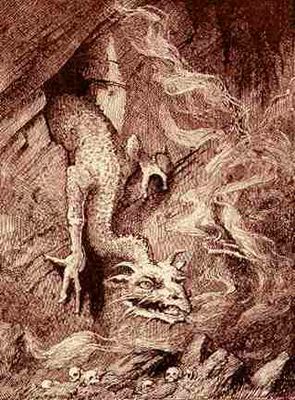
For a brief time, all the Rings of Powers were presumably worn and used in Eregion between the time Sauron left the Elves after the rings were made (1590 SA) and when Sauron forged the One Ring (1600 SA). But as soon as Sauron put on the One Ring, the Elves took off all their rings for they finally saw through the deceptions of Sauron and realized that their creations would only be corrupted and used for evil:
"But the Elves were not so lightly to be caught. As soon as Sauron set the One Ring upon his finger they were aware of him; and they knew him, and perceived that he would be master of them, and of all that they wrought. Then in anger and fear they took off their rings."
[The Silmarillion].
Some counselled that their rings be destroyed but the Elves could not bring themselves to destroy the Rings -- and so they were hid. The Seven and the Nine were separated. Of the Three, Celebrimbor gave one, Nenya, to Galadriel, and the other two, Vilya and Narya, to Gil-galad. In turn, Gil-galad kept Vilya and gave Narya to Cirdan of the Grey Havens to hold. An alternate to this version states that during the first Council of the Second Age, it was deemed wise that Elrond receive the ring Vilya and Gil-galad kept Narya until departing to war in the Last Alliance.
Angered that his plan was revealed and failed, Sauron made war on the Elves to claim the Rings without his help they could not have made. He laid Eregion to waste and sacked the Elvish city of Ost-in-edhil. He then captured and tortured Celebrimbor into revealing where the Rings were hidden:
"There Sauron took the Nine Rings and other lesser works of the Mirdain; but the Seven and the Three he could not find. Then Celebrimbor was put to torment, and Sauron learned from him where the Seven were bestowed. This Celebrimbor revealed, because neither the Seven nor the Nine did he value as he valued the Three: the Seven and the Nine were made with Sauron's aid, whereas the Three were made by Celebrimbor alone, with a different power and purpose."
[Unfinished Tales]
Using Celebrimbor's body as a battle standard on a pole, Sauron returned with war and overran all of Eriador in search for the Three Elven Rings. But he never found them and only suspected where they were hid. With the help of the Numenoreans, Sauron was finally driven out of Eriador c. 1701 Second Age and there was peace for a long while.
Sauron's power was later challenged by the Numenoreans and he was taken back as prisoner where through the use of the One Ring he corrupted them and incited them to rebel against the Valar. Then Iluvatar was called on and the world was changed and Numenor drowned in the ocean. Sauron went down as well, but his spirit fled (with the Ring) back to Middle-earth. When he took shape again he saw how the Numenoreans had grown in strength where their new kingdoms sprang up. He resolved to make war and drive them out before they became too strong. Then the Last Alliance was formed between Elves and Men to battle Sauron. There, before the Black Tower, Barad-dur, Sauron was thrown down and vanquished in the year 3441 Second Age.
But after a respite, Sauron's spirit appeared again in the Third Age and threatened the free people in Middle-earth. Around the year 1000 Third Age the Istari, or Wizards, came to Middle-earth to help in the struggle against Sauron. Last to come was Gandalf and Cirdan was moved to give Narya to Gandalf as he saw that it would be put to better use:
"Take now this Ring, he said; for thy labours and thy cares will be heavy, but in all it will support thee and defend thee from weariness. For this is the Ring of Fire, and herewith, maybe, thous shalt rekindle hearts to the valour of old in a world that grows chill."
[The Silmarillion]
So at the time of the story of Lord of the Rings, the Three Elven Rings were in the hands of the Wise; Gandalf, Elrond, and Galadriel, the Nine Sauron held, as well as four of the Seven (the other three were consumed by dragons), and the One was in the hands of Frodo the Hobbit.

Why were the Rings of Power Made, and what were their Powers?
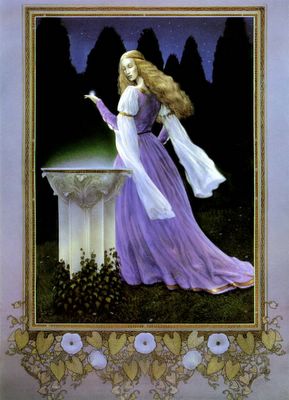
(John Howe)
The reason is tied to the regret the Elves had for the passage of time. The Elves were immortal and were fated to live as long as Middle-earth lasted. As such, the earth changed with the passage of time, and the Elves saw many things that were fair become destroyed and lost by the hurts of evil. Sauron, as tempter, awoke a desire in the hearts of Elves to heal the hurts of the earth and create a paradise on this side of the sea to compare to Valinor -- and to be its rulers; whereas in Valinor they were only subjects and below the Valar. The Rings of Power were primarily made to slow the passage of time and preserve their creations of beauty. Yet they had other powers as well.
Tolkien provides a revealing insight on to the nature of the Rings and their powers in one of his letters:
"The chief power (of all the rings alike) was the prevention or slowing of decay (i.e. 'change' viewed as a regrettable thing), the preservation of what is desired or loved, or its semblance - this is more or less an Elvish motive. But also they enhanced the natural powers of a possessor - thus approaching 'magic', a motive easily corruptible into evil, a lust for domination. And finally they had other powers, more directly derived from Sauron... such as rendering invisible the material body, and making things of the invisible world visible."
[The Letters of J.R.R. Tolkien #131]
The Rings were not made as instruments of war or domination; they could not create lightning bolts or hail storms. Yet, they conferred powers commensurate with that of the user; a Great Ring in the hands of a weak and lesser person could not work effects to the extent of the wise or great. Notice Galadriel's words to Frodo in Lothlorien:
"Did not Gandalf tell you that the rings give power according to the measure of each possessor? Before you could use that power you would need to become far stronger, and to train your will to the domination of others."
[The Fellowship of the Ring]
The Elves used the Three Rings to create "islands of timeless beauty" and guard them against the passage of time and evil. Their use can be seen at work at various points:
~ Elrond used the power of his ring, Vilya, to cause the flood
of the river Bruinen when the Nazgul tried to capture Frodo.
~ Galadriel used the power of her ring, Nenya, to keep a guard
on Lothlorien so that none could enter without her leave.
~ Gandalf used the power of his ring, Narya, to kindle the hearts
and spirits of the enemies of Sauron to do great deeds. And quite
possibly to assist him in his battle to the death with the Balrog.
But the use of the Elven Rings was possible only after Sauron was defeated in the Second Age and his Ring taken and assumed lost. If Sauron regained the One, then all the works of the Elves and the use of their Rings would be subject to the evil will of Sauron.

How many Rings of Power were Made?

The verse in the Lord of the Rings makes explicit reference to 20 Rings of Power:
Three Rings for the Elven-kings under the sky,
Seven for the Dwarf-lords in their halls of stone,
Nine for Mortal Men doomed to die,
One for the Dark Lord on his dark throne
In the Land of Mordor where the Shadows lie.
One Ring to rule them all, One Ring to find them.
One Ring to bring them all and in the darkness bind them
In the Land of Mordor where the Shadows lie.
These are the Rings of Power made in the Second Age and concern the events of the Third Age.

A garden...

A garden...teems with life. It glows with colour and smells like heaven and puts forward at every hour of a summer day beauties which man could never have created and could not even, on his own resources, have imagined...when the garden is in its full glory the gardener's contributions to that glory will still have been in a sense paltry compared with those of nature. Without life springing from the earth, without rain, light and heat descending from the sky, he could do nothing. When he has done all, he has merely encouraged here and discouraged there, powers and beauties that have a different source.
C.S. Lewis, The Four Loves (1960)

Húrin on Thangorodrim
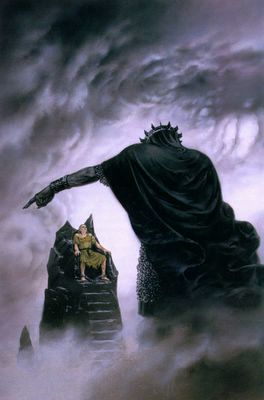
(Húrin on Thangorodrim [Ted Nasmith])
Tolkien loved archaic language, in which he often used far beyond the tolerance of the modern reader, when he wrote alliterative verse. He sometimes succumbed to all the temptations the alliterative form offers to a literary scholar: the opportunity to use archaic words to meet the alliterative requirements, the temptation to distort the syntax to meet the rhythmic demands of Anglo-Saxon alliterative meter, and various other sins less besetting, such as the temptation to include filler material for the sake of the meter. However, once tuned into Tolkien's world, the difficulties fall away in a plethora of wonderful, and often terrifying images:
Then Thalion was thrust to Thangorodrim,
that mountain that meets the misty skies
on high o'er the hills that Hithlum sees
blackly brooding on the borders of the north,
To a stool of stone on its steepest peak
they bound him in bonds, an unbreakable chain,
and the Lord of Woe there laughing stood,
then cursed him for ever and his kin and seed
with a doom of dread, of death and horror.
There the mighty man unmoved sat;
but unveiled was his vision, that he viewed afar
all earthly things with his eyes enchanted
that fell on his folk- a fiend's torment.
(The Lay of the Children of Húrin, lines 92-104)

Bors to Elayne (Kings Coins - Final)

The Archbishop answered the lords;
his words went up through a slope of calm air:
'Might may take symbols and folly take treasure,
and greed bid God, who hides himself for man's pleasure
by occasion, hide himself essentially: this abides -
that the everlasting house the soul discovers
is always another's; we must always lose our own ends;
we must always live in the habitation of our lovers,
my friend's shelter for me, mine for him.
This is the way of this world in the day of that others';
make yourselves friends by means of the riches of iniquity,
for the wealth of the self is the health of the self exchanged.
What saith Heracleitus? - and what is the City's breath? -
dying each other's life, living each other's death.
Money is a medium of exchange.'
Arthurian Poets (The Boydell Press) 1991
(extract)

Bors to Elayne (Kings Coins - III)

Taliessin's look darkened; his hand shook
while he touched the dragons; he said 'We had a good thought.
Sir, if you made verse you would doubt symbols.
I am afraid of the little loosed dragons.
When the means are autonomous, they are deadly; when words
escape from verse they hurry to rape souls;
when sensation slips from intellect, expect the tyrant;
the brood of carriers levels the good they carry.
We have taught our images to be free; are we glad?
are we glad to have brought convenient heresy to Logres?'

Subscribe to:
Comments (Atom)




